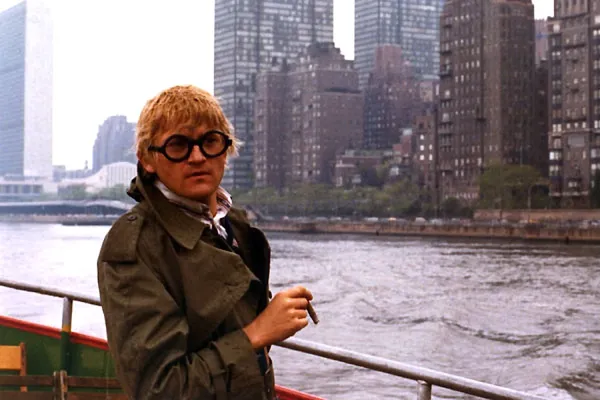 |
| Catherine Cusset on David Hockney: "His big innovation in painting is to introduce movement into painting." |
For the theatrical première of Metrograph Pictures 4K restoration of Jack Hazan's A Bigger Splash, Life Of David Hockney novelist Catherine Cusset was invited to introduce the film. As part of the celebration, Andy Warhol's feature Henry Geldzahler and a program of three short films - Christian Blackwood and Michael Blackwood's David Hockney's Diaries, David Pierce's Portrait Of David Hockney, and James Scott's Love's Presentation will be screening on Sunday.
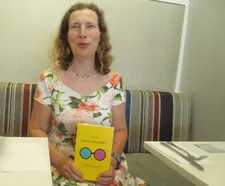 |
| Catherine Cusset on Life Of David Hockney: "I think this novel is about giving meaning. All the time. The paintings and the way this and that happens to him." Photo: Anne-Katrin Titze |
Catherine Cusset met with me at the downtown peacefood cafe for an in-depth conversation on her latest novel and the connection to A Bigger Splash. We talked about Olivier Assayas's Non-Fiction, having dinner with David Hockney at Le Grand Hôtel Cabourg (of Marcel Proust fame), Hockney's upcoming show at Pace Gallery in New York, the artist's mother meeting Cary Grant, a Susan Sontag anecdote, and what it means for Cusset to fill in the blanks when writing a biography of a living artist in the shape of a novel.
Anne-Katrin Titze: You are one of the people introducing A Bigger Splash at Metrograph.
Catherine Cusset: I was wondering if I'm not going to read the passage on the film in my book. It would be a good way to introduce the film I think. It's a funny thing. There are two ways to look at the film. You can look at the film as a film about David Hockney, which is of some kind of historical importance, because it is showing his life in the Seventies, the London of the 1970s. On the other hand, the way I write about it, it's about the role it played at the time in David Hockney's life and the effect it had on him, which was very strong. Very powerful, and it was not a pleasurable effect. He was not happy.
AKT: No, he was devastated, it seems. Twice you mention the film in your novel. The first time it's about a young filmmaker - you do not name him - who gave Hockney the daylight lamps.
CC: Yes, that's the only reason why he accepted to be filmed because he didn't like to have someone filming him. He wasn't against the film itself - if this guy wanted to follow him. But he didn't like to be filmed when he was working, so that was kind of an exchange. He tells it. I didn't invent it. Sometimes in my novel, it's not that I invent, but sometimes I fill the blanks. I did fill the blanks with what I say about the film.
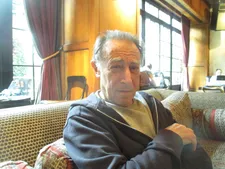 |
| Catherine Cusset on Jack Hazan's A Bigger Splash: "There are two ways to look at the film." Photo: Anne-Katrin Titze |
In different places I read a couple of things. After he saw the film, David walked out and he wanted to stop the film. He wanted to have it forbidden. And then he had this friend who said "It's a good film, you should not do that." But I had the feeling it was not about the quality of the film. Then I read somewhere else in an interview that after seeing the film he came back to Paris and he stayed in bed for two weeks. So then I ordered the film and I watched it and I was very struck by the fictional scenes. Jack Hazan paid Peter Schlesinger to play this scene in which he's having sex with another man who is not at all his lover at the time.
AKT: Exactly. This was not the man he had a relationship with.
CC: It's a fiction scene but the camera is really focused on Peter's body - his undressing, his back, his buttocks. I could imagine! You know, love has no gender. I think art and love have no gender. As an artist whether you're a man or a woman, gay or heterosexual, you're going to experience the same alternant of happiness and despair, faith and lack of faith and doubts. It's for everyone. And love is the same thing. I think we experience sorrow, happiness, passion, jealousies the same way.
AKT: Yes, watching that scene you can't help but think, what if you were watching someone who broke up with you? After having mourned the relationship for a time and then you see this on screen?
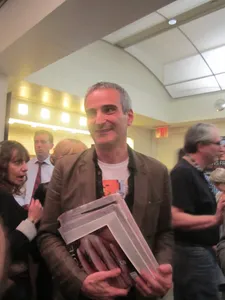 |
| Catherine Cusset on Olivier Assayas's Non-Fiction: "It's full of scenes that I think are very true, very contemporary." Photo: Anne-Katrin Titze |
CC: You see the body you've been trying to forget for three years! That is forbidden to you! That was a body you loved and now you have no more access. And there it is on film and it's hitting you. I felt it was hitting him in the face so violently. I just imagined the incredible pain that David went through, but I think it's very consistent with what I read.
I think even more so now, because when I saw David in France in April this year, 2019, I was mentioning that the film was coming out at The Metrograph and he said "Yeah, at some point Jack Hazan was going through a very difficult divorce and I told him, 'Jack, you know, what if I came with a video camera and I filmed you?'" He didn't think it was a funny joke.
AKT: I interviewed Jack Hazan recently and he said that David Hockney says this to him every time they meet - "You didn't tell me about your divorce! I would have filmed it!" It seems to have become a running gag.
CC: Not quite 50 years later, yes, of course it's a joke now. But it was definitely not a joke at the time. The way I write my novel, which is really the trajectory of an artist and a man, you know, from childhood to old age, I choose to focus on certain episodes. It's my vision, it's my interpretation, and I am convinced that David Hockney never opened up to anyone the way he opened up to Peter. I am convinced this was the greatest love of his life. After that he was always somewhat protected.
AKT: After an experience of heartbreak you are no longer the same, yes. I was amazed by the sense of movement I got in your novel. It's almost as if the wind is blowing in my face driving along the California coast while I'm reading about Hockney's life.
CC: I think this is really what characterizes me as a writer. What you say about this book is what people say about all of my novels. I really work on rhythm. I'm not a musician, but it's all about the rhythm. It has five chapters, my book, and each chapter was centred on an essential moment.
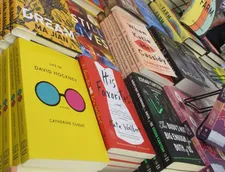 |
| Catherine Cusset's Life Of David Hockney at the Strand Bookstore: "Sometimes in my novel, it's not that I invent, but sometimes I fill the blanks." Photo: Anne-Katrin Titze |
AKT: I see the affinity concerning movement.
CC: His big innovation in painting is to introduce movement into painting. This is what he has always been so incredibly eager to do. His whole fight with photography. Using photography against itself when he is doing the photomontage. It's the principle of photography which is only one moment, he's putting all these moments together. So his big idea is to put time inside the artwork.
AKT: You say in the preface that you met David Hockney for the first time in May 2018, after the book was published in French, and mention the beautiful anecdote he tells you about his encounter with a black rabbit and a magpie. How was that encounter with Hockney? How did he react?
CC: He hadn't read the novel yet, because he doesn't read French. He only knew reports he got about my book and they were positive. Mostly his assistant JP [Jean-Pierre Gonçalves de Lima] who has been the closest person to him for more than twenty years - he loved my book, JP. It's JP who engineered that first meeting.
It was weird, I mean he was extremely nice and he invited me to come to California, which unfortunately I couldn't do this fall. And that little story that I loved - that's my only regret. If I had been able to interview him for the book … First I think I would have written the book first, because I believe in writing. I don't believe in writing after the research. I believe in the movement of writing coming from some kind of an instinct, some vision.
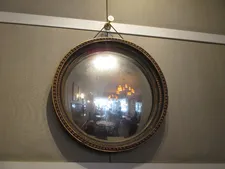 |
| Catherine Cusset: "People are fragile and then you put their life in front of their eyes. That mirror can be too powerful. Writing is dangerous." Photo: Anne-Katrin Titze |
AKT: You were writing the novel while doing the research?
CC: I read the books [on Hockney] and then I wrote the novel. If I had been able to contact him and question him, I think the book would have been even better.
AKT: I found the chapter of the symposium on optics very interesting because I was at that symposium.
CC: You were?
AKT: Yes, I was there.
CC: Unbelievable! I was not at all.
AKT: I didn't get a sense of sadness from him. I was also invited by him to the dress rehearsal for Parade [at The Metropolitan Opera] shortly after. What I had forgotten was that this took place three months after 9/11.
CC: I know. I was struck by this.
AKT: I remember now how it jolted us back into life, the fact that we could be concerned with something else for a moment. With art. And I remember a Susan Sontag moment that day. People were lining up in the courtyard for the afternoon session, amongst them a friend of hers. She walked up to her, there were hugs, obviously a friend. And then Susan Sontag just let her stand there, in line, in the December cold and walked in.
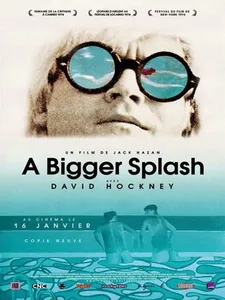 |
| A Bigger Splash French poster |
CC: Unbelievable. So was my description accurate?
AKT: It was, with the exception of his sadness, which I didn't sense.
CC: It's not sadness. I think what he felt was more like, not a waste of time, but time to move on, time to go back to painting. Because he had spent three years on this and didn't really paint during these three years. The symposium, if you see this in time, of course you can't see this in the moment, it is December 2001, three months after 9/11 and it's two months before he goes to London and is painted by Lucian Freud. And this is the beginning of a completely new period in David's life.
AKT: David Hockney's mother met Cary Grant? Or did you invent that?
CC: Yes! No, I didn't invent at all.
AKT: Where did that come from, that tidbit?
CC: Many things were in the biographies. I can't remember. I filled five, you know those Muji notebooks?
AKT: I do.
CC: I filled five with all the information I found and I wrote a very specific timeline. I think it's really important when something happens. The novel is anchored in time. The body lives in time and by reconstructing time like this, we are with David Hockney, with his body, with his mind. At the moment of creation, not retrospectively.
AKT: There is a memorable moment when student David Hockney decides to spend more than he can afford on taking a taxi, only to find a totally unexpected check waiting for him at the school. Some magic is at work there. I like also your description of the hair dying incident in California and how a decision on a whim can have such unexpected consequences for your identity.
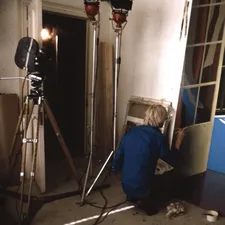 |
| Catherine Cusset: "The novel is anchored in time. The body lives in time and by reconstructing time like this, we are with David Hockney, with his body, with his mind." |
CC: I think this novel is about giving meaning. All the time. The paintings and the way this and that happens to him. I think this is why it makes a compelling reading. I like meaning.
AKT: It's nice, I don't think I've ever heard anyone use that phrase. It's beautiful. I like meaning too.
CC: I like things that connect. I like fullness. Sometimes artists are more about leaving blanks and unfinished. But David Hockney is also an artist of the fullness. It's very full what he does, right? You will see when this new show takes place.
AKT: Tell me about the new work!
CC: He is painting. He went to Normandy this winter in order to paint the Norman spring. He has a beautiful little house with his assistant in this small village inland in Normandy. He has everything there, he doesn't need to go out of the garden.
AKT: You visited him this April?
CC: Yes, I visited him with his French gallerist. His name is Jean Frémon, owner of the Lelong Galerie, who also has a house in Normandy close to David's house. So we all had dinner at Le Grand Hôtel Cabourg, which is the Proust hotel. So that was great. It was really great, a beautiful moment. One of the moments that you keep - having dinner with David Hockney in Proust's hotel with a beautiful sunset on the sea.
AKT: And the Normandy paintings are coming to New York this fall?
CC: At the Pace Gallery in September. I won't be here for the opening. It's opening on September 14. The joy he has painting now at the age of 81, 82 in July, very soon.
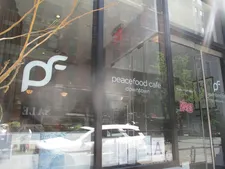 |
| Vegan peacefood cafe on East 11 Street in New York Photo: Anne-Katrin Titze |
AKT: Here we are in a vegan cafe. You write that Hockney grew up vegetarian. Is he still? Was he at your dinner?
CC: No, he had a Proust sole.
AKT: I am sure you saw Olivier Assayas's Non-Fiction. What did you think?
CC: I have seen it some time ago when it came out in France. You know at the end, when it ends with the writer who is going to write a novel about having the affair with the wife of the publisher? This is what I would have been interested in. It's the real stuff. Actually I've been very concerned by this. Because I have written books of people close to me. My mother, my mother-in-law, a friend who committed suicide, and each time it's a great great problem. You know, what is the limit of fiction? And David Hockney, whom I don't know, but he's alive.
AKT: That's exactly why I was asking you.
CC: The truth is that when I write I cannot think about the fact that it's a real person. I am so much invested in the project. There is writing and there is publishing. I don't compromise in my writing. I did another book I never published because it was on a too sensitive subject for my husband and it was a choice. If I had published it, then I have to pay for the consequences and lose my husband. A choice I have to make. I am not writing anything at the detriment of the people I write about, this is not my point. But you never know how people can be vexed or hurt.
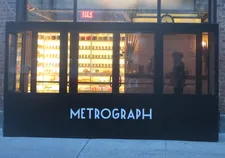 |
| The 4K restoration of A Bigger Splash is screening at Metrograph Photo: Anne-Katrin Titze |
AKT: Absolutely.
CC: People are fragile and then you put their life in front of their eyes. That mirror can be too powerful. Writing is dangerous.
AKT: So is painting. So is photography. Seeing yourself how another sees you.
CC: Right, that's not me at all!
AKT: Back to Non-Fiction for a moment.
CC: The thing is good, it's full of scenes that I think are very true, very contemporary. Good questions about TV series and reading on Kindle all those things that he's talking about. It would be a very interesting story to have the story of a novel written about the characters who are in the film, not someone we don't know, we don't care about. What happens if this writer is writing the novel of this affair? This is what I would like to see.
AKT: I noticed nature descriptions leaping off the page when you describe the hawthorn in Holland Park.
CC: You are good! The one place I went to was Holland Park. I went to London to see the show because I had not seen his work in real. I had to see it. I was miraculously staying with a friend who was living near Holland Park and I started to look again at my timeline.
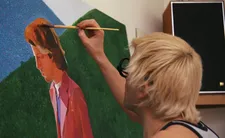 |
| Catherine Cusset on David Hockney with Peter Schlesinger: "I am convinced this was the greatest love of his life. After that he was always somewhat protected." |
I am thinking, the starting point [for Hockney's change in direction for his paintings, to watercolors] is that month of March and it's Holland Park. I realized, to sit for Lucien Freud, he crossed the park every day. And it was the same time! I went in March. Being there I wrote this passage. It was too much compared to the rest of the book. I toned it down.
AKT: It's still there. The blossoms are coming at you. And you are wearing flowers today.
CC: I am David Hockney's garden. It won't work if you don't have a picture of the dress.
AKT: I will take a photograph right now. The mirror above you is also perfect in the optics and Vermeer context.
CC: It is.
The 4K restoration of A Bigger Splash is screening at Metrograph in New York.
On Sunday, July 7 at 1:15pm the short film program David Hockney on Film and at 5:30pm Andy Warhol's Henry Geldzahler will screen at Metrograph.
Catherine Cusset's Life of David Hockney novel (2019) is available from Other Press.
David Hockney will have new work exhibited in New York at Pace Gallery, 524 West 25 Street from September 14 through October 12.





















